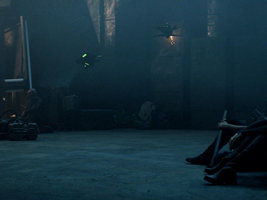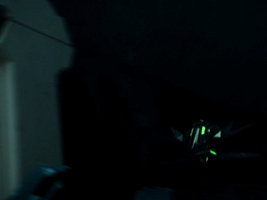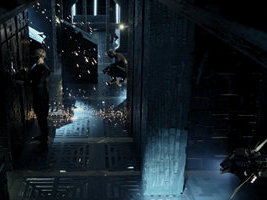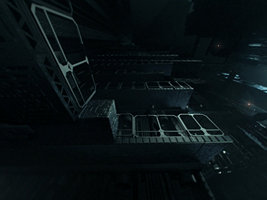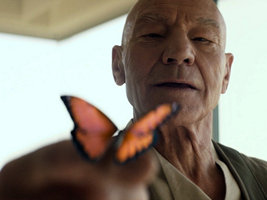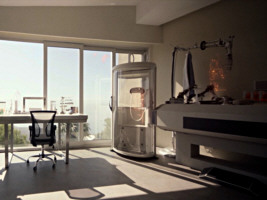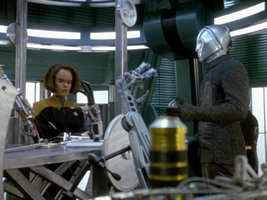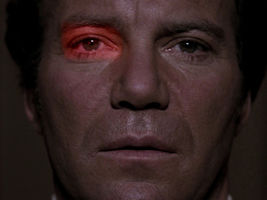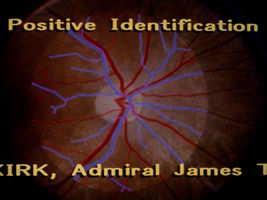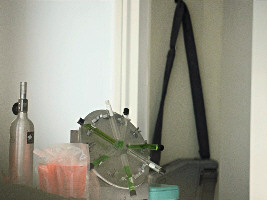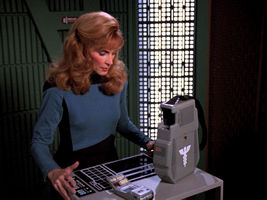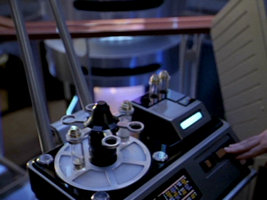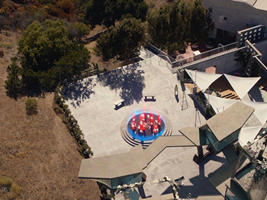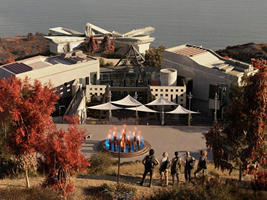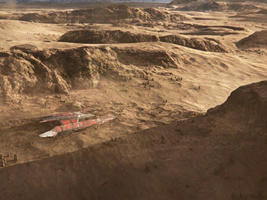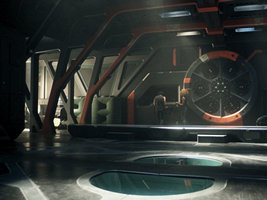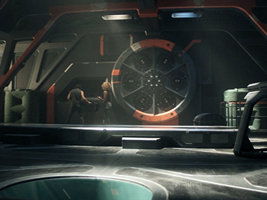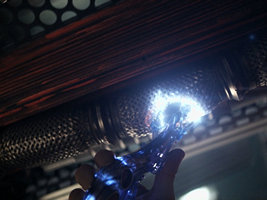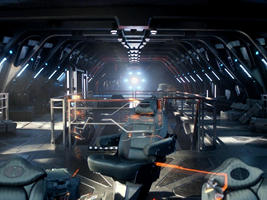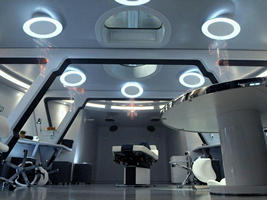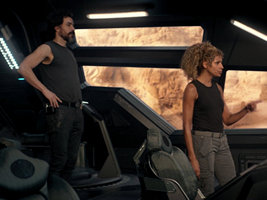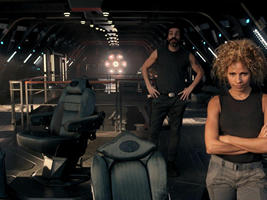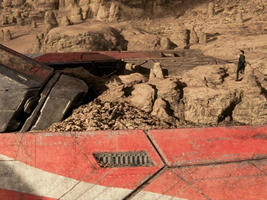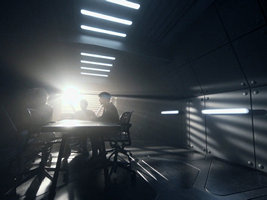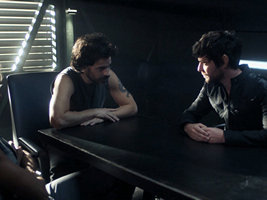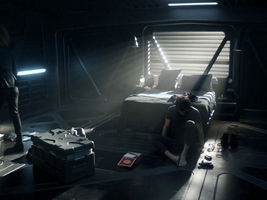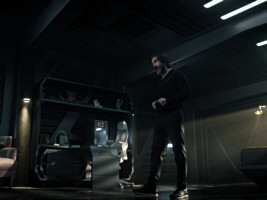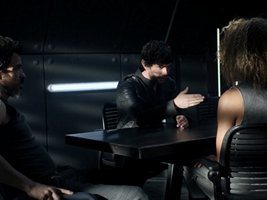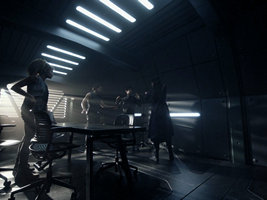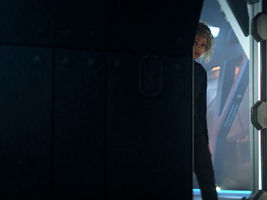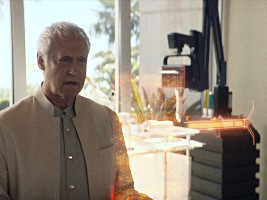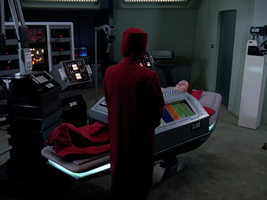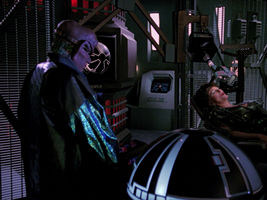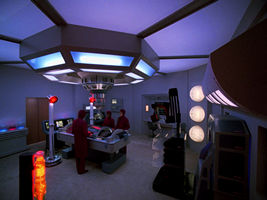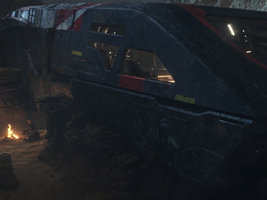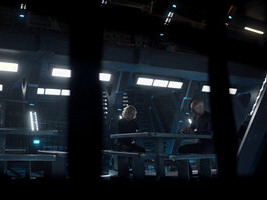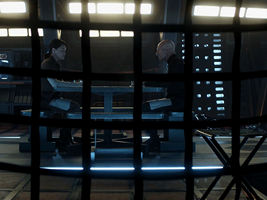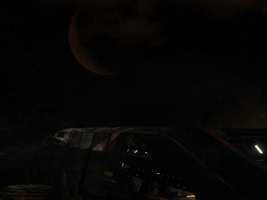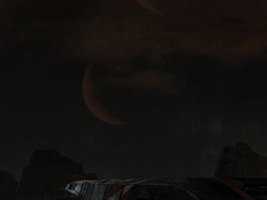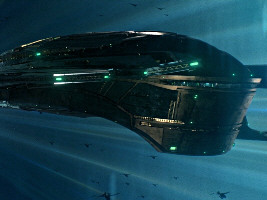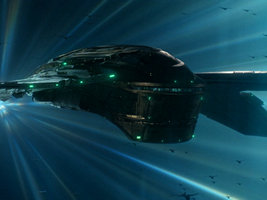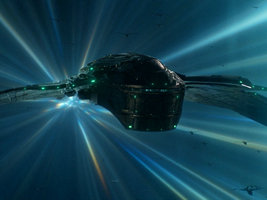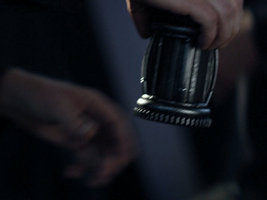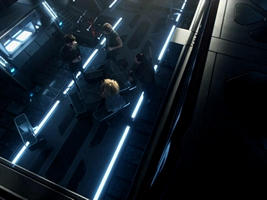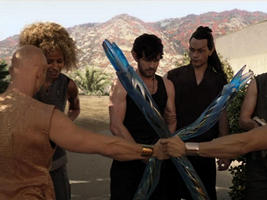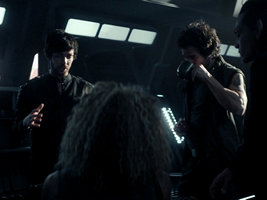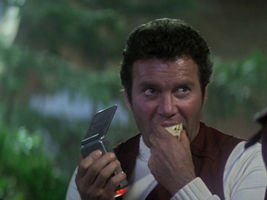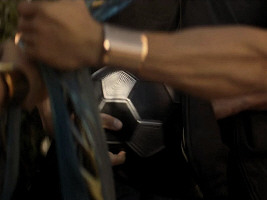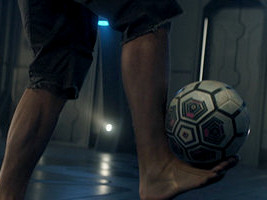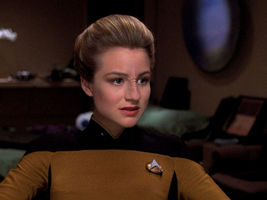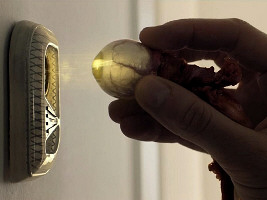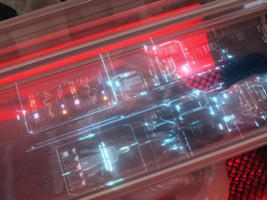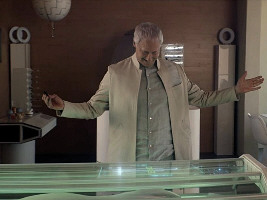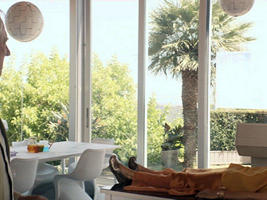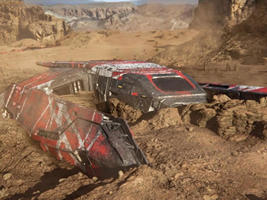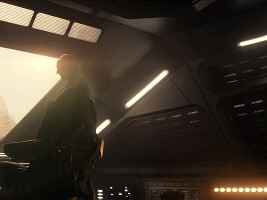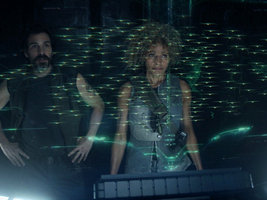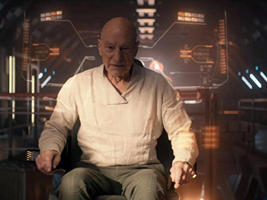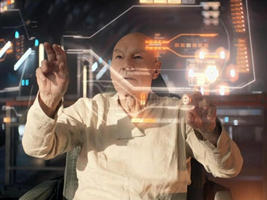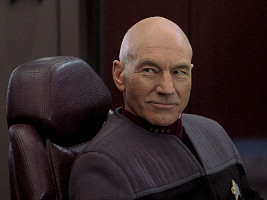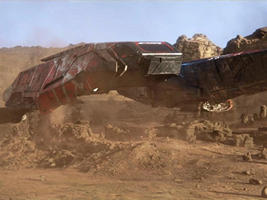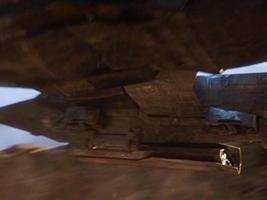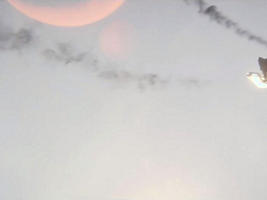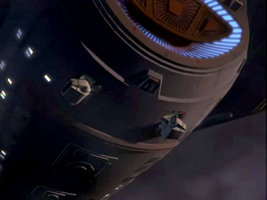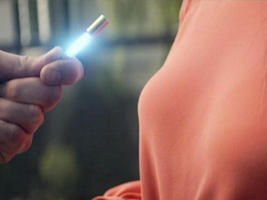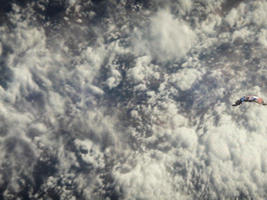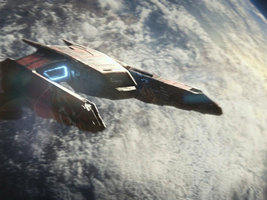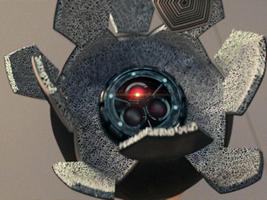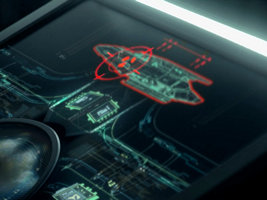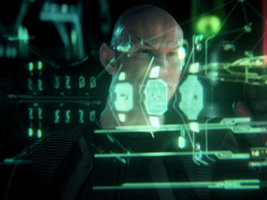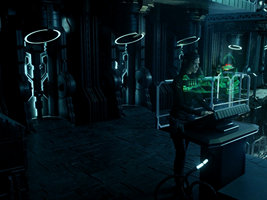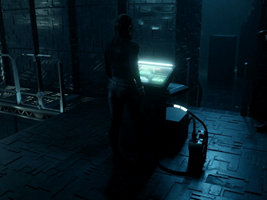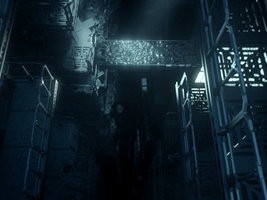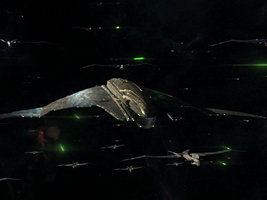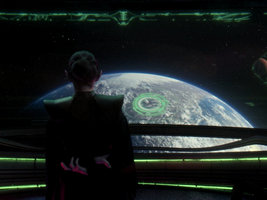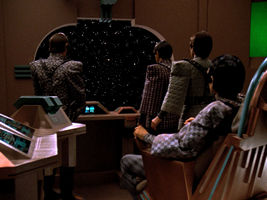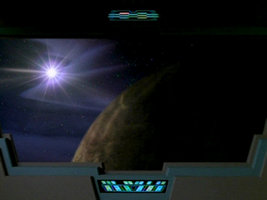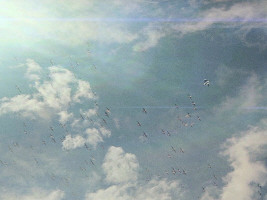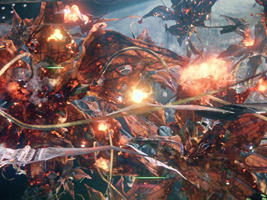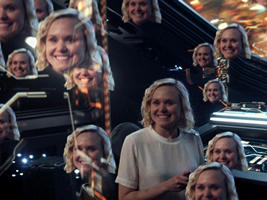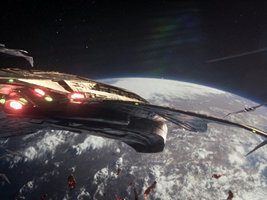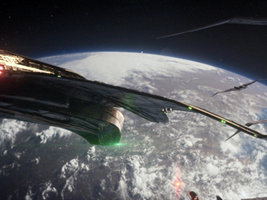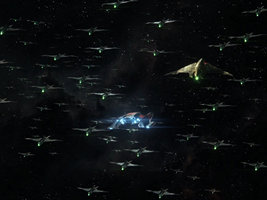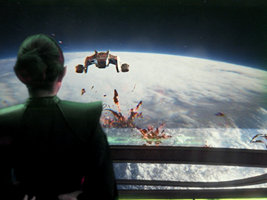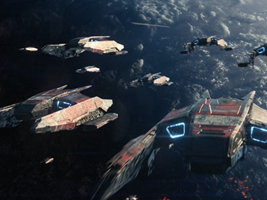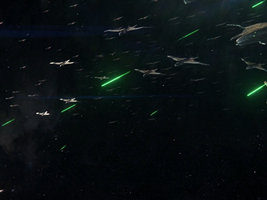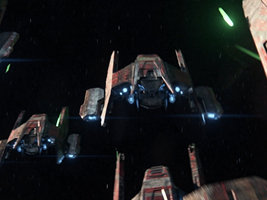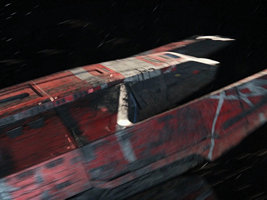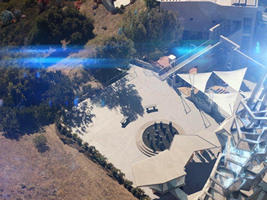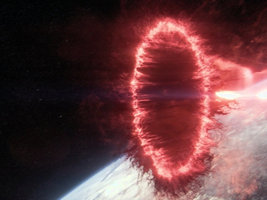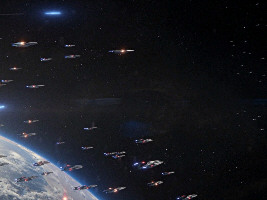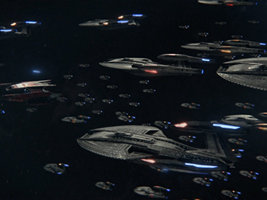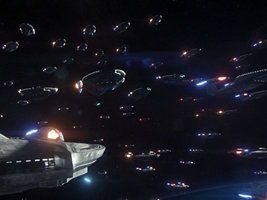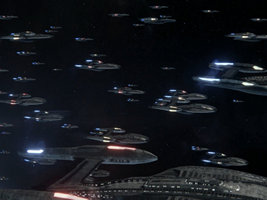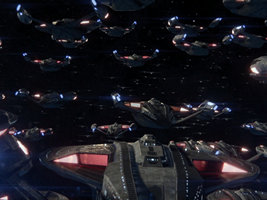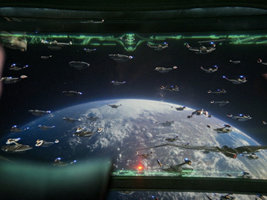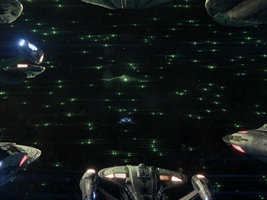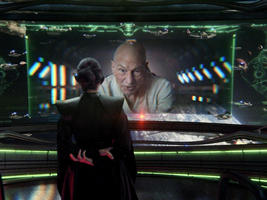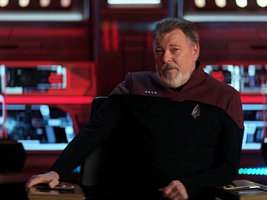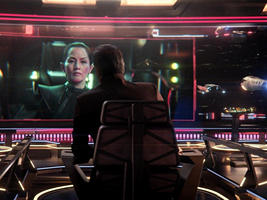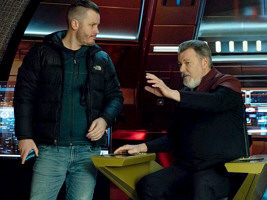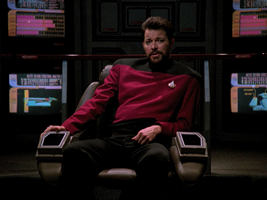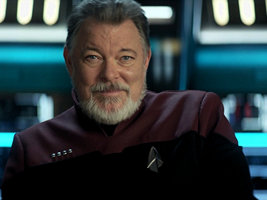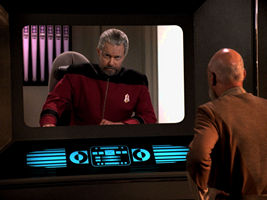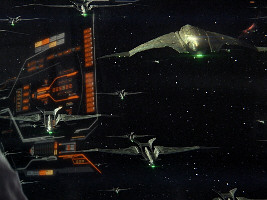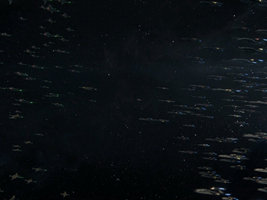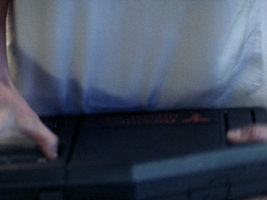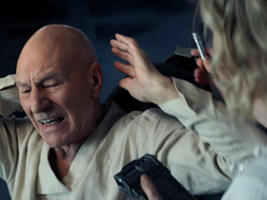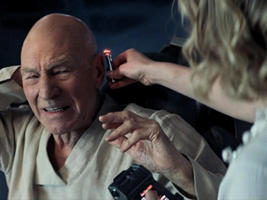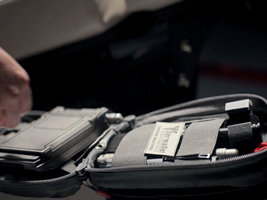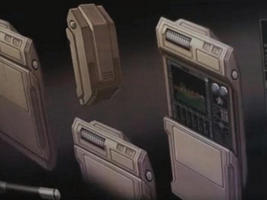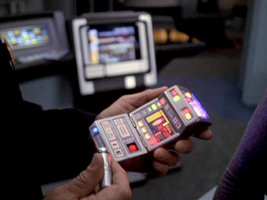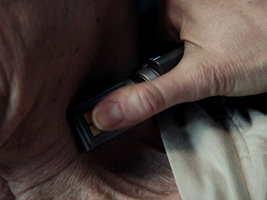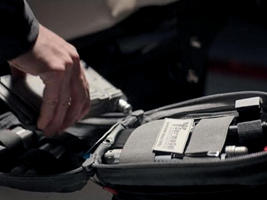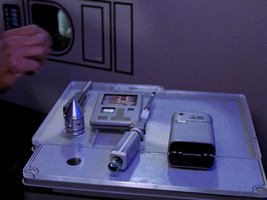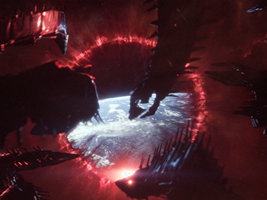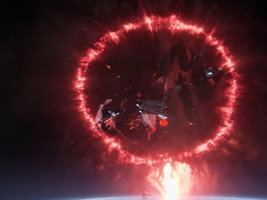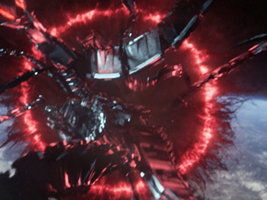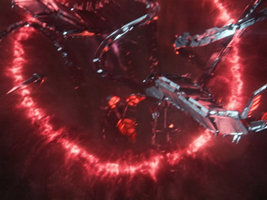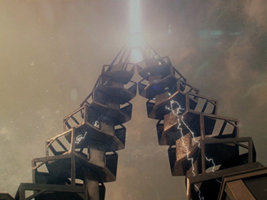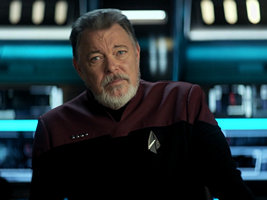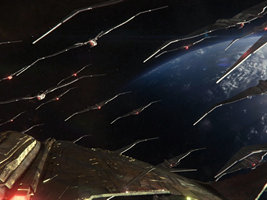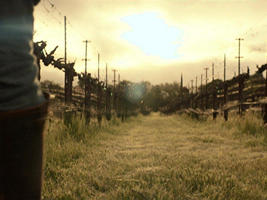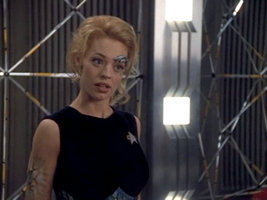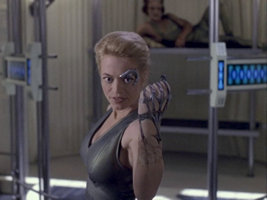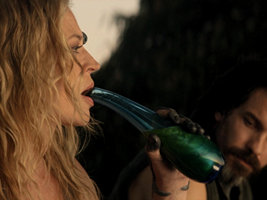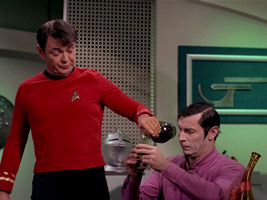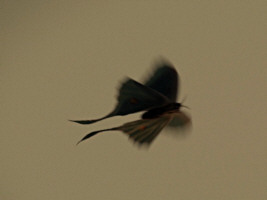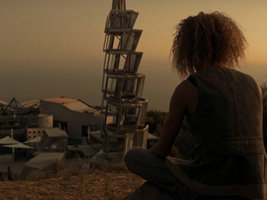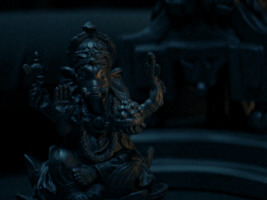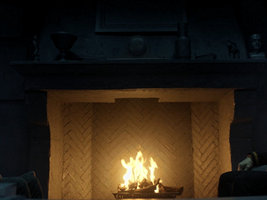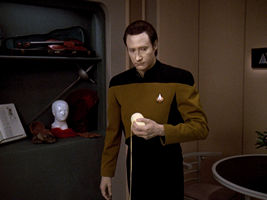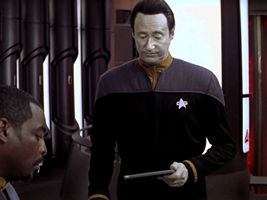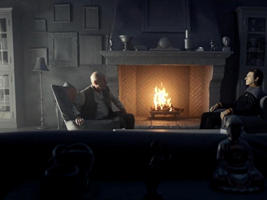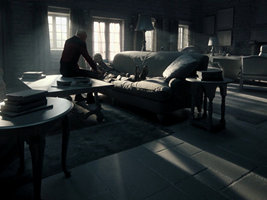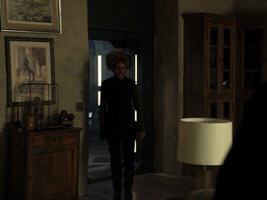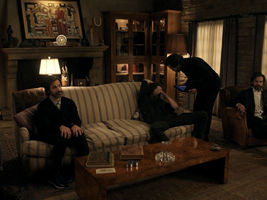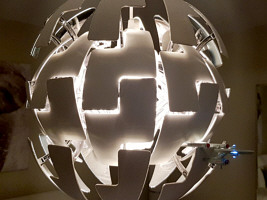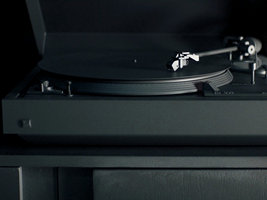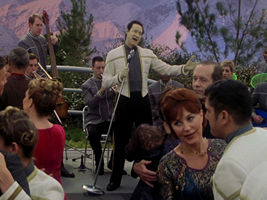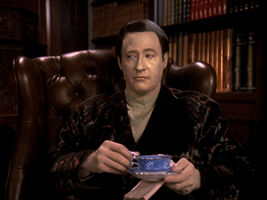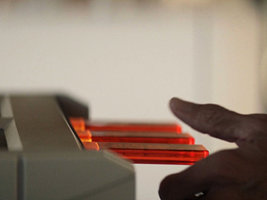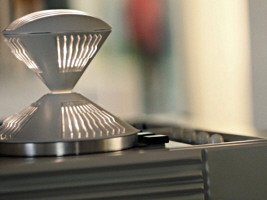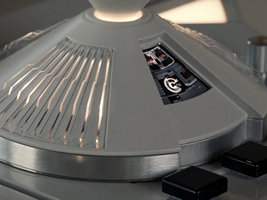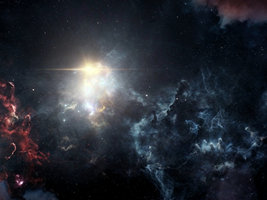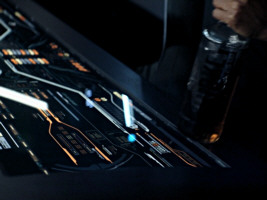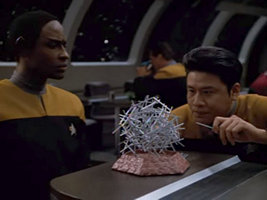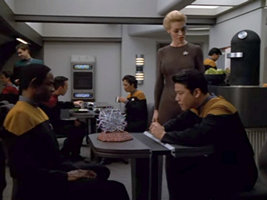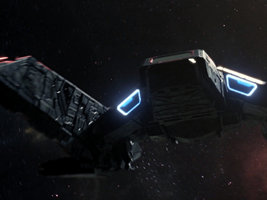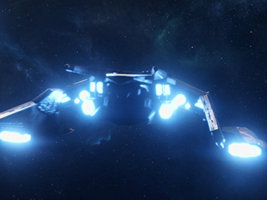Observations in PIC: "Et in Arcadia Ego II"
by Jörg Hillebrand and Bernd Schneider
Here are some observations about sets, props, make-ups and visual effects in PIC: "Et in Arcadia Ego II", with special attention to continuity with previous Star Trek series and movies.
Chronological List
Observation 01
The intricate surface of the Borg cube is nicely seen in these screenshots.
Observation 02
Several small Romulan drones are hovering inside the Borg cube in this scene. The drones first appeared in "Maps and Legends". One drone was seen scanning Ramdha in "Absolute Candor".
Observation 03
The massive interior of the Borg cube is highlighted in these nauseating shots. It also serves as foreshadowing for Narissa's ultimate demise.
Observation 04
A small artificially created butterfly changes its color as it lands on Picard's finger.
Observation 05
A few robotic arms are located on the desk in Picard's room. Similar, but less rudimentary robotic arms were seen in the Pralor lab in the Voyager episode "Prototype".
Observation 06
In order to be let in, Soji must conduct a retinal scan. The same technology appeared in "Star Trek II: The Wrath of Khan" and DS9: "Q-less".
Observation 07
There's a small bottle with the Starfleet logo in use since the third season of DS9 and a centrifuge with a green liquid on the desk next to Soji. A different type of centrifuge was often seen in Voyager's sickbay. In the background, a medkit (featuring an "old-school" medical tricorder) can be seen, similar to the one later used by Dr. Jurati aboard La Sirena. Medkits with a slot for a medical tricorder first appeared in the TNG episode "I, Borg" and were used on TNG and DS9 until the end of the latter series.
Observation 08
A nice shot of Coppelius Station showing the holographic fountain and the beacon being built. A shot from the previous episode "Et in Arcadia Ego I" shows the same location from a different angle.
Observation 09
Another shot of the crashed Borg cube.
Observation 10
A beautiful establishing shot showing the crashed La Sirena on Ghulion IV.
Observation 11
After the upper level of La Sirena appeared only very briefly in the previous episode "Et in Arcadia Ego I" (when Raffi hands Soji a phaser), it is seen fully in this episode. The sickbay skylights, through which light shone in the previous episode, are fully visible here as well.
Observation 12
Rios uses the device the androids gave him to "fix" the fused intermix frame.
Observation 13
Both sickbay and the main deck of La Sirena come back to life.
Observation 14
Orchids are seen hovering around Coppelius Station. A different shot showed the flowers hovering around the station, ready to take off, in the previous episode "Et in Arcadia Ego I".
Observation 15
These shots of La Sirena's cockpit show that the window blinds are open. Later in the episode, they will be lowered. In the second screenshot, the upper port exit hatch can also be seen opened on the left side. In the third screenshot the upper starboard hatch is open.
Observation 16
Two shots show La Sirena's bow section. The nose art, featuring the words "La Sirena" is visible in the first screen cap. The second one also shows the open upper starboard hatch.
Observation 17
This briefing room is seen for the first time in this episode. Like Rios' quarters, it features a large window with window slants. The set is most likely a redress of Rios's quarters.
Observation 18
These two shots show the area of the room featuring the door. A comparison shot from "Broken Pieces" shows the area behind the door to Rios's quarters. The shot from "The End is the Beginning" illustrates were Rios's quarters (and the conference room seen in this episode) must be located. It is on the port side of the ship, close to the transporter platform, behind the armory. That also means that Raffi's quarters is just a redress of Rios's quarters minus the front section featuring the large window. A wall was put in the larger set to make Raffi's quarters appear smaller.
Observation 19
A console that previously appeared in countless TNG and other Star Trek episodes appears again in this shot.
Observation 20
The front part of La Sirena's hull is shown again, this time during the night.
Observation 21
The mess hall with the recently moved replicator can be seen through the open lower starboard emergency exit door. The shots from "The Impossible Box" and "Broken Pieces" show that the replicator was originally one bay further back in the mess hall.
Observation 22
The twin-sisters Seb-Natan (the foreteller) and Seb-Cheneb (the destroyer) that Narek mentions in the campfire scene are depicted on one of the pixmit cards seen in "The End is the Beginning".
Observation 23
As the camera pans up, the blinds on La Sirena's side cockpit windows come down. The windows with lowered blinds were seen in several previous episodes. The electric storms and twin red moons mentioned in Soji's dream are also visible again.
Observation 24
Commodore Oh's new Romulan Warbird and some of the smaller Romulan ships.
Observation 25
Here, the Romulan molecular solvent grenades are seen up close. A Romulan stun/flash grenade appeared in "Broken Pieces".
Observation 26
These shots shows La Sirena's mess hall. In the first screenshot, the bridge windows and the open starboard hatch can also be seen. The second screenshot highlights the replicator on the port side, which was moved to the front for "Nepenthe" (but back in its original location in "Broken Pieces"). This becomes obvious in the comparison of the shots from "Nepenthe", "Broken Pieces" and "Et in Arcadia Ego II".
Observation 27
Both the starboard emergency doors are open in this screen cap.
Observation 28
The androids use a futuristic glowing type of staff weapon.
Observation 28a
Like the upper port emergency door in a previous scene, the lower port (left) door is also seen open here.
Observation 28b
Like Captain Kirk in "Star Trek II: The Wrath of Khan" and "Star Trek (2009)", Captain Rios eats an apple when he is faced with an impossible situation.
Observation 29
Two different kinds of footballs show up in this short scene. Both do not look like the futsal ball previously seen in "The Impossible Box". Before Star Trek Picard, a football had only been seen on Star Trek once, in Lavelle's quarters in TNG: "Lower Decks".
Observation 30
Dr. Jurati uses Saga's right eyeball to gain access to the room in which Picard is held.
Observation 31
Dr. Bruce Maddox's award on his bedside table can be seen a lot better in this episode after it was only glimpsed in the previous one. The text still cannot fully be made out but the words in the first line of text seem to spell out "Dr. Bruce Maddox".
Observation 32
The "golem" created by Dr. Soong is seen nicely in these two screenshots.
Observation 33
The two lamps in this shot of Dr. Soong's lab are called PS 2014 and are sold by IKEA.
Observation 34
The nearly finished beacon can be seen in these two screenshots.
Observation 35
The closed bridge side window blinds. In the night shot showing La Sirena during a thunderstorm, the blinds were lowered.
Observation 36
A graphic of the fleet of Romulan ships, similarly to the one aboard the Borg cube in the previous episode, is displayed here.
Observation 37
In this episode, Picard finally sits in the captain's chair again and takes command of La Sirena. He was last seen in the Captain's chair in command of a ship at the end of "Star Trek Nemesis".
Observation 38
La Sirena retracts its landing struts and lifts off in this sequence. Another starship capable of planetary landing, featuring landing legs was the Intrepid-class USS Voyager. The ship was seen landing on a planet surface in episodes such as "The 37s".
Observation 39
It becomes clear now that the beacon was previously part of the Admonition vision in "Broken Pieces".
Observation 40
Dr. Soong uses a small hand-held device to shut off Sutra.
Observation 41
These three shots show La Sirena in orbit of Ghulion IV. The same two cloud-like structures from the second shot were also seen close to the planet in the previous episode.
Observation 42
A molecular solvent grenade appears inside the football and is then caught by Soji. The prop looks different from the grenades seen earlier in the episode.
Observation 43
Soji works on a colorful holographic display to activate the transmitter beacon.
Observation 44
A 3-D graphic of La Sirena appears on Narissa's Romulan holographic display and later again on a display aboard Oh's Warbird.
Observation 45
The set of the Borg cube is extended using CG effects. In the second shot, we can see that Narissa used a small case to power up the Romulan console.
Observation 46
Oh's Warbird and the rest of the Romulan fleet in orbit of Ghulion IV.
Observation 47
General Nedar (Commodore Oh's real name) looks at the main viewscreen of her Romulan Warbird. Screenshots from "Face of the Enemy" and "The Die Is Cast" show what the viewscreen on a Romulan Warbird looked like in past episodes.
Observation 48
The Romulan ships as seen from the ground.
Observation 49
The orchids are launched to fight the Romulan fleet. In these scenes, small Romulan Snakehead class scout ships are seen in orbit of the planet for the first time. Narek was piloted a ship of this type beginning in "Nepenthe".
Observation 50
Several copies of Dr. Jurati's face are projected by the android device.
Observation 51
A close-up of the hull of La Sirena as it flies through what remains of the orchids. Two windows with window slats can clearly be seen.
Observation 52
More shots of General Nedar's Warbird as it powers up its main disruptor and faces the portal opened by Soji.
Observation 53
A multitude of copies of La Sirena faces the Romulan fleet.
Observation 54
The beacon starts sending a signal to the artificial entities and opens a portal to their home. On the planet surface, the beacon is blue while it appears red in space.
Observation 55
Just in the nick of time, the Federation fleet, commanded by Captain Riker, arrives. It seems to consist of no more than two very similar ship types that can only be distinguished by the shape and arrangement of their nacelles. Captain Riker is in temporary command of the USS Zheng He.
Observation 56
The scenes with Captain Riker were filmed on a redressed USS Discovery bridge. Two of the starboard wall consoles are located behind him and the plexiglass screens of the consoles in front of them was removed. A photo from Jonathan Frakes's Instagram page further illustrates where this scene was filmed on the Discovery bridge. Riker's posture while sitting on the Captain's chair is similar to how he sat on the captain's chair of the USS Enterprise-D bridge or battle bridge in several TNG episodes.
Observation 56a
The star map on the bridge of the Zheng He is identical to the one previously seen in Admiral Clancy's office in "Maps and Legends". We can see this very well on a photo from Jonathan Frakes's Instagram page. If we try hard, we can read "Ferengi Alliance" (near the three brown sectors above the Federation emblem), Cardassian Union (yellow, on the left) and Talarian Republic (blue, lower left).
Observation 57
Compare this aged William Riker to how he appeared in "All Good Things".
Observation 58
A shot of the Romulan fleet facing the Federation fleet and as it appears on the viewscreen of La Sirena.
Observation 59
As Captain Riker commands all Starfleet ships to set "deflectors on full", this is accompanied by an effect of a blue shimmer on the hull of the Federation ships.
Observation 60
Dr. Jurati looks at a bioscan of Jean-Luc Picard.
Observation 61
A medkit with internal medical tricorder, similar to the ones used on TNG since late season 5 and on DS9 is used by Dr. Jurati in this scene. The same medkit was seen earlier in Picard's room at Coppelius Station. The medkit features the Starfleet Medical logo in a rare red version. See also The Evolution of the Starfleet Medical Emblem.
Observation 62
The medical tricorder previously used by Dr. Jurati in "Et in Arcadia Ego I" is seen much better in the second part of the finale. It becomes clear that the display can be slid open and she uses the handheld scanner to take a reading of Picard. Shots from the first part, the Ready Room episode and previous Star Trek episodes and films show previous medical tricorders.
Observation 63
Dr. Jurati uses a hypospray like the ones seen in 24th century Star Trek since the beginning of TNG. A similar hypospray previously appeared in a different medkit in "Et in Arcadia Ego II". Comparison shots show the prop in earlier incarnations of Star Trek and the late 24th century hypospray, introduced in "Starburst City Rag".
Observation 64
The artificial lifeforms slowly come through the portal.
Observation 65
This shot of the beacon previously appeared in the mind melds featuring footage of the Admonition in "Broken Pieces" and "Et in Arcadia Ego I".
Observation 66
The bridge of the USS Zheng He is seen again without red alert lights being turned on.
Observation 67
The Romulan fleet retreats.
Observation 68
As Captain Picard lies dying, the visions of the vineyard ("Et in Arcadia Ego I") and Data ("Remembrance") return.
Observation 69
The ladder leading up from the mess hall to the bridge can be seen in this shot showing the interior of La Sirena.
Observation 70
The sun sets over Ghulion IV.
Observation 71
Seven's bare arms were only rarely seen on Voyager. They only two episodes that come to mind are "Hope and Fear" and "Tsunkatse". As can be seen, the Borg implant on her right upper arm and the extension of her left hand implant are consistent with what was previously established on Star Trek Voyager.
Observation 72
Seven and Rios drink "what passes for alcohol" at Coppelius Station. Like in several earlier cases, "it's green".
Observation 73
Another synthetic butterfly flutters by.
Observation 74
The comparison screen cap from "Et in Arcadia Ego I" shows that the whole beacon complex on the right was built for the second episode, using mostly CG elements.
Observation 75
The gray painted clock in Data's quantum simulation is not the same one as the one on the mantelpiece in Picard's study.
Observation 76
There are several sculptures on the small side table in the study. There's an elephant, a sculpture of Ganeshahe, a Hindu deity and "the remover of obstacles, the patron of arts and sciences and the deva of intellect and wisdom", a Buddha sculpture and one of Saraswati, the Hindu goddess of knowledge, music, art, wisdom and nature. All these references to Hinduism might have something to do with Data naming his daughter Lal after the Hindi word for "Beloved".
Observation 77
On the mantelpiece, there are a phrenology bust, a cat statue and several books. This is a reference to Data's quarters beginning in season 5. One of his books was always on display. Another book was a Shakespeare volume given to him by Captain Picard. The cat sculpture refers to Spot, of course. The sculpture on the left seems to be wearing a Phrygian cap. In Roman times, this signified freedom. The French national allegory Marianne is also usually depicted wearing a Phrygian cap, so this might be a reference to Picard being French.
Observation 78
Data is seen wearing the "First Contact"-style uniform he last wore in "Star Trek: Nemesis".
Observation 79
The study in Data's quantum simulation is a redress of Picard's Château Picard study.
Observation 80
The Picard golem awakens in Dr. Soong's lab. On the left, a partially opened IKEA PS 2014 lamp can be seen.
Observation 81
The record player on the quantum simulation was made by Dual. It seems to be a Dual 506 Belt Drive turntable. It plays "Blue Skies", composed by Irving Berlin and performed by Isa Briones this time. Brent Spiner famously performed the song as Data in "Star Trek Nemesis". The season ends with this song, just as began with it, with Bing Crosby singing in "Remembrance".
Observation 82
Data wears a dressing gown, similar to the ones he wore as Sherlock Holmes in "Elementary, Dear Data" and "Ship in a Bottle" and in an alternate future in "All Good Things".
Observation 83
The three orange chips Picard pulls out of the device look like isolinear optical chips, while the device looks like an hourglass, signifying that Data's time has come to an end. Small orange isolinear chips are a rarity. There are two large orange isolinear chips/PADDs in Picard's ready room aboard the USS Enterprise-D, however.
Observation 84
Data ages and then dies, turning into stardust.
Observation 85
Raffi and Seven of Nine are playing kal-toh, a game Tuvok and Harry Kim often played on Star Trek: Voyager. In "The Omega Directive", Seven quickly finished a game between the two. They are also drinking whiskey from the same bottle Raffi was drinking from in "The Impossible Box".
Observation 86
La Sirena flies off into the distance, new adventures awaiting.
Credits
Most screen caps from TrekCore and Trek Caps.






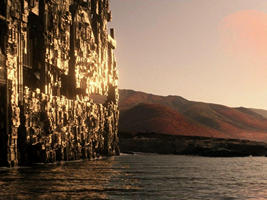
 Borg cube in PIC: "Et in Arcadia Ego II"
Borg cube in PIC: "Et in Arcadia Ego II"
